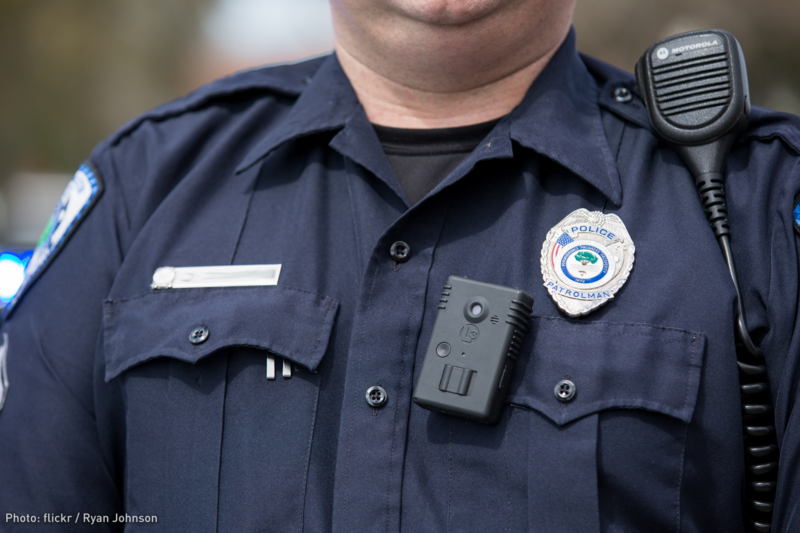NYPD Union’s Lawsuit Could Reverse-Engineer Body Cameras Into Surveillance Tools


New York City’s largest police union doesn’t believe in public accountability for its officers. The Patrolmen’s Benevolent Association made this abundantly clear again last week when it sued the city in an effort to block the release of NYPD body camera footage, citing a state civil rights law that bars the release of certain personnel records.
If the union’s lawsuit is successful, it will create a nightmare scenario for police reform advocates, like the New York Civil Liberties Union, who hoped body cameras could increase transparency and accountability for police departments across the state.
The lawsuit argues that section 50-a of the New York State Civil Rights Law, which limits the release of certain police personnel records, prevents the city from releasing body camera footage, unless an officer consents to the release. The suit contends that body camera footage qualifies as a type of personnel record because it could be used as part of an officer’s performance evaluation.
In reality, this is another ploy to keep the public in the dark about what police officers are up to and to make an already opaque police disciplinary system even more inaccessible. Police shootings and other police activities deserve close public scrutiny, and it is a gross distortion of state law to claim it bars the release of body camera video. This lawsuit is bad for police accountability and without legal merit.
It’s worth remembering why the NYPD got body cameras in the first place. The current body camera pilot program was ordered by a federal judge, who found that the department’s stop-and-frisk policy violated the rights of hundreds of thousands of Black and Latino New Yorkers. The cameras were intended to provide the public with a window into what NYPD officers were up to and to rebuild the badly damaged relationship between officers and the communities they are supposed to serve.
If a judge were to side with the PBA, it could mean that the public would be kept from accessing footage of police misconduct. Journalists could be barred from getting the footage and reporting on it. Family members of people killed by officers could be prevented from seeing video of deadly encounters. Under the PBA’s misinterpretation of the law, if the killing of Eric Garner had been recorded on a body camera instead of a bystander’s cell phone, the footage may have never reached the public eye.
A win for the PBA would turn body cameras, paid for with millions of dollars in taxpayer funds, into yet another NYPD mass surveillance tool to be used against vulnerable New Yorkers. Public support for body cameras will not last if the police accountability aspect of the devices is erased and they simply become public surveillance devices.
This would be a devastating blow for holding officers responsible for their actions and would negate the potential value body cameras could add to improving police-community relations.
The litigation also has the potential to neuter and warp body camera programs being implemented by departments across the state, as section 50-a applies statewide. And body cam footage isn’t the only kind of public record that the police want to push down the memory hole. The NYCLU currently has a case pending in the state’s highest court arguing that 50-a does not prevent the release of redacted judicial opinions in NYPD disciplinary trials, and we balked at the city’s attempt to suddenly hide NYPD decisions relating to officers’ mistreatment of New Yorkers.
But organizations like the NYCLU, the media, and members of the public shouldn’t have to spend years in court fighting for the right to access these public records. That’s why the NYCLU is calling on state lawmakers to get rid of 50-a. The law is unnecessary and has been used by opponents of transparency to keep important information about police misconduct shrouded in darkness.
The PBA’s lawsuit is based on an erroneous interpretation of the law. But so long as 50-a remains on the books, the police will attempt to hide behind it and twist the law in ways that undermine the public’s right to hold government power accountable.




